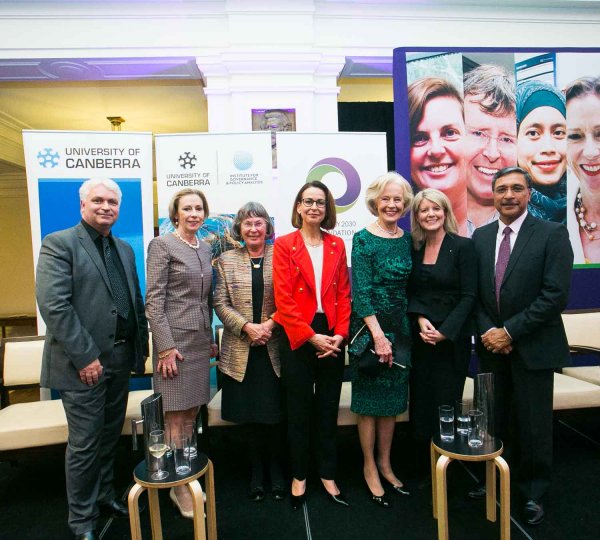What prompted you to write ‘On Violence’?
More people than ever before have asked what they can do to end the scourge that is violence against women and children, so I thought it was time to give some tips to Australians who were keen to be a part of this mission. I’m hoping to galvanise community and political attention, but I also hope there are some tips in the book that everyday Australians can say ‘oh I hadn’t thought of that’ or ‘that’s something I can do in my workplace or sporting club’ for example.
Last year’s death toll – literally the body count of women and children – should have been enough to prompt every agency and certainly all governments to react with vigour and support and policies as well as resourcing
The statistics regarding violence against women are harrowing, and not something you’d expect in a country such as Australia without it being declared as a national crisis. Why do you think this is?
I am as surprised as most are people at the moment. I think last year’s death toll – literally the body count of women and children – should have been enough to prompt every agency and certainly all governments, particularly our federal parliament, to react with vigour and support and policies as well as resourcing. I really believe that this is a national emergency, and I am staggered at the lack of political response to that in recent times.
In terms of Australia’s position compared to other countries – we know worldwide around a third of women have experienced some form of physical violence or sexual violence – unfortunately we’re part of that global average and we have some statistics in our region that are absolutely harrowing. The figures in Australia belie the fact that we consider ourselves an equal, fair, safe nation because clearly, while women and children are living in fear and losing their lives, we’re not a safe nation in that respect, and we’ve got a lot of work to do.
So, when you’re talking about these issues, are your arguments ever met with resistance? Or are we simply just too complacent?
I think it’s a mix of factors – first of all there are a lot of people who are genuinely unaware of the extent of the problem. People who are not directly and personally affected by violence against women and children are often surprised and shocked by the statistics.
I also think there are a lot of Australians who find it really difficult to grapple with. The women and children who I talk about in the book, who have been subject to abuse and even murdered, they’re pretty horrific statistics and stories, and they make us panicked and sad at what’s going on, and sometimes we feel that we can’t contribute or address these issues.
I feel that increasingly people want to make change and there’s a wonderful sector that understands the extent of the problem, and has been working for decades to try and do something about it. Now it’s time for a whole of population, whole of community response to these issues, because that’s the only way that we’ll start to address the issue of men’s violence against women.
Also, we have to create a society that is more equal in terms of gender equality, and one that better reflects our diversity and difference, and in doing that we will actually come to address some of the key drivers of violence against women and children in the first place. That is the focus of the book – primary prevention; stopping the violence before it starts.
 Gender aside, how is violence against women different from violence against men?
Gender aside, how is violence against women different from violence against men?
Women do experience violence very differently in terms of its nature, and in terms of the severity of that violence. It tends to be more intimate partner violence. We know that men are more likely to experience violence at the hands of someone they don’t know, and usually in a public place, whereas women and children are more likely to be assaulted by, or be victims of violence, at the hands of someone they know.
Of course any violence against any person is wrong, and that’s not saying that men can’t be victims. In a very small minority of cases women can also be perpetrators. But overall we cannot ignore the fact that this is very gendered violence, and that around 95% of perpetrators are male.
This is not about demonising men … one of the strong messages I hope people will get from this book is the fact that men and women have to work together
What are your thoughts on #NotAllMen? Are we at risk of overgeneralising and by default implicating innocent ones?
If we are really concerned about alienating men, or about men’s sensitivities in discussing this issue, we’re never going to be able to discuss this issue openly and honestly. The majority of men who are not perpetrating violence, and the majority of men who want to see violence prevented and eliminated in our society recognise that it is necessary for us to highlight the fact that gender inequality is at the heart of violence against women and children, and the reality is that the majority of perpetrators are men. We have to acknowledge those basics.
This is not about demonising men – in fact one of the strong messages I hope people will get from this book is the fact that men and women have to work together. It’s not just about male perpetrators learning that their behaviours is wrong, and stopping that behaviour, or that behaviour being held to account. It’s about us as a society creating a new normal, where we all model respectful and ethical relationships, behaviours and attitudes. And that’s not easy, but we’ve got to start and that means working together.
Of course it’s not all men, but all men have a role in alleviating this violence. And it’s fascinating, the number of men I’ve spoken to who say ‘actually, you know what? When you think about it, I probably do laugh along with sexist jokes in the office, or when I go to the pub there are inappropriate or lewd behaviours I don’t challenge, or I have a friend of the family, or a sister, or someone I know, who’s been subject to this violence. Or even just demeaning and sexist attitudes and sexual harassment, and maybe I could be a better bystander’. So there’s room for all of us to play a role in creating a better society.
As an advocate you’re constantly dealing with both very emotional personal stories and deeply disturbing statistics – does this take a toll on you? And if yes, how do you manage that?
I find it haunting. I really do, and in the past the combination of being Australia’s ambassador for women and girls and spending a lot of time in countries where this violence was endemic, and the level of violence was just extraordinary, particularly in our region, that, combined with my work through the National Organisation to Prevent Violence against Women and Children meant that both on a national basis as well as internationally – I was constantly reminded of this heinous manifestation of gender inequality, I was constantly meeting victims of violence and working with governments and others to try and stop this violence.
But I’m not a frontline worker, so what I see and what I know and hear and the people who reach out to me… I mean I find that complex and disturbing enough. I found writing the book very emotional to be honest. And how you deal with that – I’m very lucky to have a supportive immediate family unit, and that reminds me every day of what a lot of people don’t have. I receive a lot of support and derive a lot of inspiration from coming home to a safe and usually very happy household. I know there are circumstances where people don’t have that and I know what it’s like when you don’t, and that is what spurs me on every day.

Prof Mark Evans; Adjunct Prof Carmel McGregor PSM; Emeritus Prof Meredith Edwards AM; Virginia Haussegger AM; Dame Quentin Bryce AD CVO; Natasha Stott Despoja AM; Prof Deep Saini, Vice-Chancellor University of Canberra
Do you have any particular achievements that you’re most proud of to date?
The fact that primary prevention is finally on the national map is a great achievement for the sector generally. It’s taken a long time for governments, all state and territory governments as well as the commonwealth, to adopt primary prevention strategies.
Obviously governments like short term solutions, they like to be able to show something within an election cycle timeframe. That’s not always possible working in this area, so they’ve tended to be very wary of investing in long term, sustainable, whole of population solutions, and that is what primary prevention requires.
It’s extraordinary that in the last four, five, almost six years we’ve seen a real elevation of the notion of prevention, but that should never of course come at the expense of intervention, and services that are designed to support women and children leaving violent situations, or going through the courts, or requiring support in other ways. We need a whole suite of reforms and resources in order to ensure that we have a safer society – a violence free society – for men, women, boys and girls.
Anything else you’d like to add?
I’m very proud of the work of Our Watch, and I think it’s always important to acknowledge that that came about because of the work of two ministers, the former minister Julie Collins who was a Labor minister in the Commonwealth Government, and the former Victorian minister Mary Wooldridge who was in a Liberal government, those two women came together across jurisdictions, across party political boundaries, and created a national foundation dealing with whole of population work to prevent violence against women and their children.
To me that’s extraordinary, and I’m very proud to be the chair, and I’m proud that all my author royalties will go to Our Watch so anyone who buys the book can feel that they’re making a contribution to an organisation that’s doing a lot of work.
Beyond that, it’s an opportunity for people to look in the book and think ‘you know what? Even in the way that I talk to my children, or even the expectations that I have of my sons and daughters, or maybe I’ll implement code of conduct at work, or consider lobbying the boss to implement domestic violence paid leave’. There are a range of little ideas in the book that I hope will be useful for people.
On Violence by Natasha Stott Despoja is out now. RRP $14.99, Ebook $9.99.
Read a short extract of the book here.
Natasha Stott Despoja AO is an Australian politician, diplomat, gender equality advocate and author. She’s a Professor in the Practice of Politics ANU. Natasha is the founding Chair of Our Watch, the national foundation to prevent violence against women and their children. She's an elected member of the UN's Committee on the Elimination of Discrimination Against Women.




